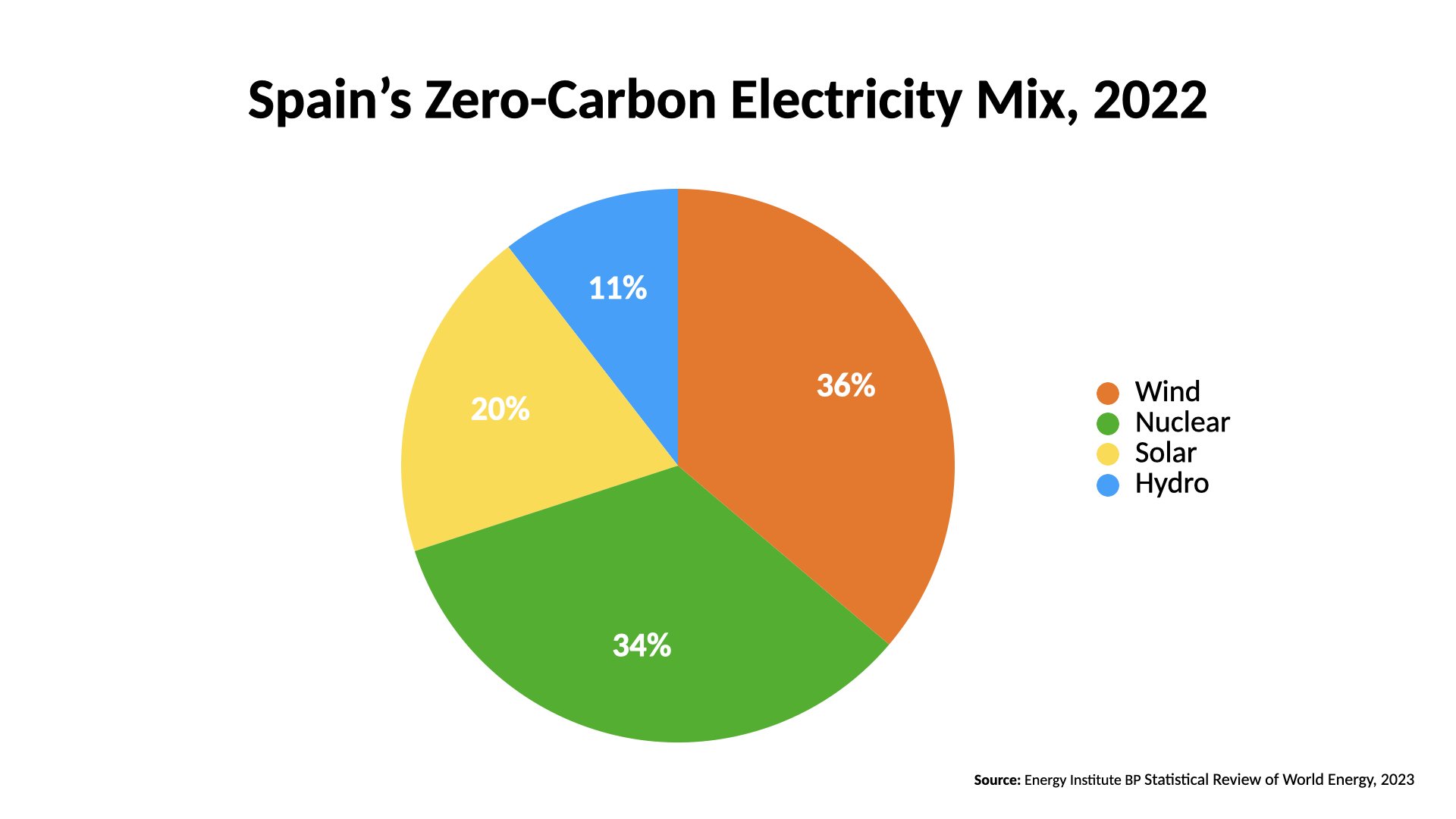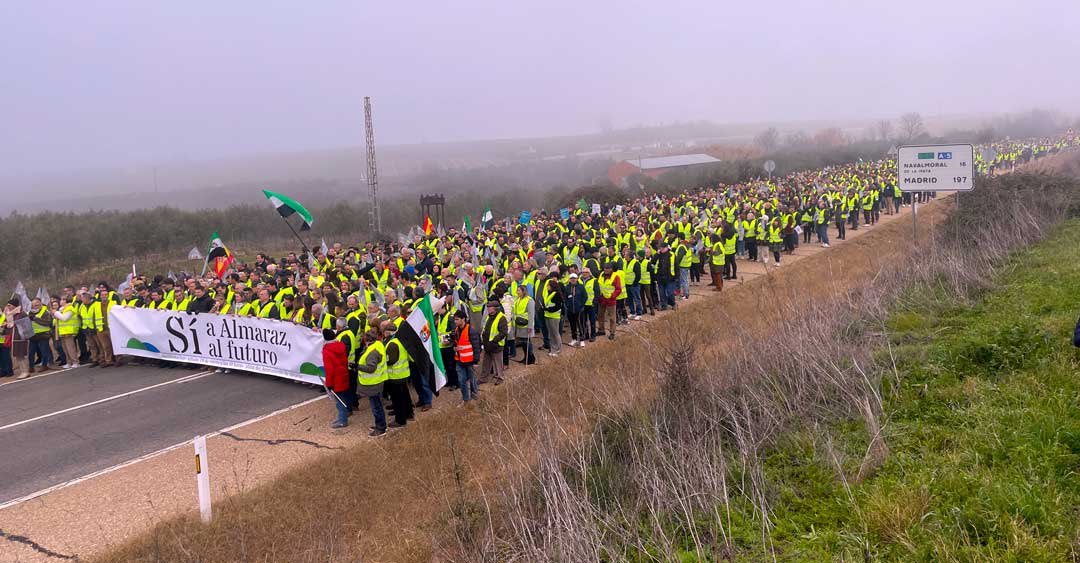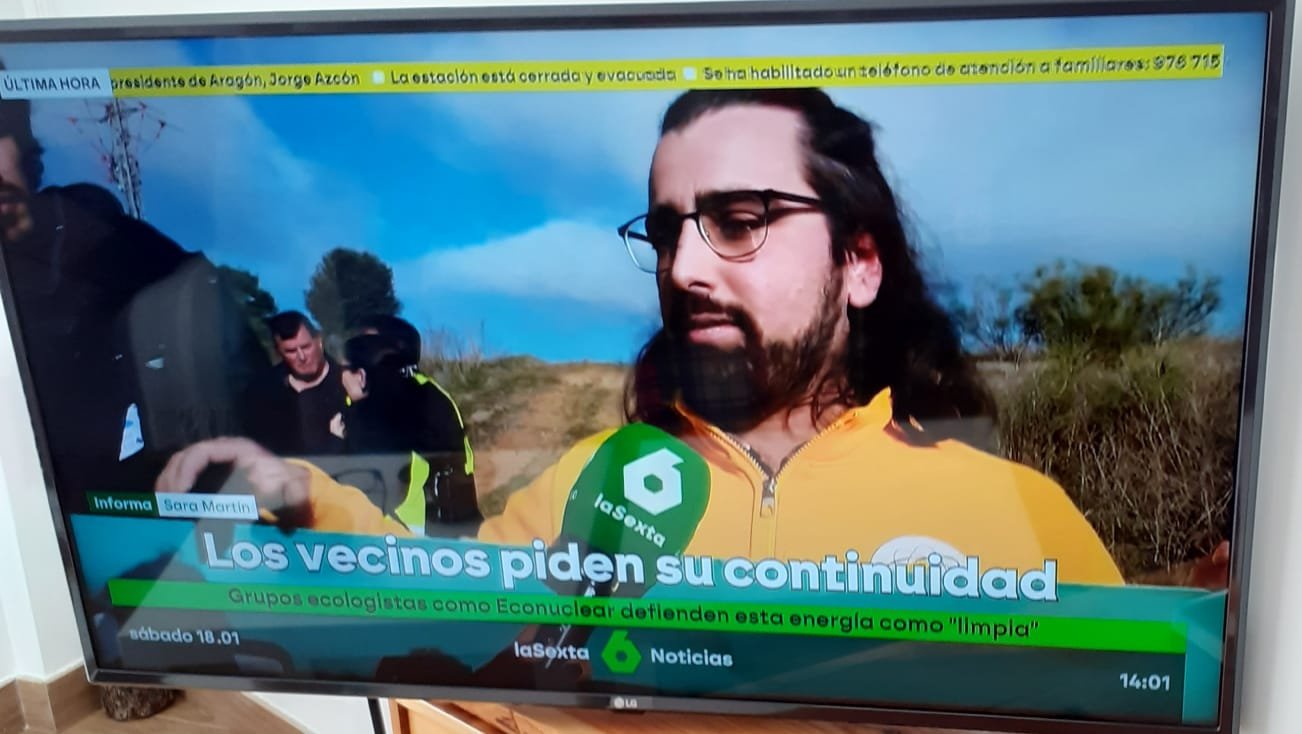SPAIN
70% of spain’s electricity comes from clean sources - 30% is dirty
Spain has five nuclear plants with a total of 7 reactors
In 2023 the Spanish socialist workers’ party passed a phase-out plan
spain’s 7 nuclear reactors supply 20% of their electricity
Nuclear generates 34% of the nation’s clean electricity, the second largest source of clean energy
the entire spanish nuclear industry employs 28,500 people. Nuclear plants directly employ 8,500
Nuclear phase-out dates: 2027-2035
Descriptions, from left to right: Nuclear Plant in Commercial Operation, Nuclear Plant Permanently Closed, Nuclear Plant being Dismantled, and Dormant Nuclear Plant
why are they shutting down their nuclear plants?
Anti-nuclear idealogy in Spain can be traced back to General Franco’s dictatorship and conflict with the Basque region - nuclear’s association with Franco produced fierce opposition and resistance. As a result, anti-nuclear sentiment spread throughout the leftist Socialist Workers’ Party and led to anti-nuclear policies during their reign. This opposition coincided with the rise of a renewable ideology that promoted solar and wind as the only acceptable, clean way to generate electricity.
What’s the current status?
As of December 27,2023, Spain’s government reaffirmed the phaseout and is planning for the complete phaseout by 2035. The first reactor, Almaraz 1, is expected to go offline in 2027. On February 27, 2025, 32 nuclear-related companies signed a manifesto urging renegotiation of the 2019 phase‑out deal. This followed a parliamentary motion on February 12 (non‑binding) directing the government to back reactor life extensions.
With the recent blackout that happened on April 28, reliability issues have been raised and reignited the nuclear phaseout debate.
On Monday 28 April at 12.33pm, Portugal & Spain had the largest European blackout, leaving 50 million without power for over 10 hours.
The nationwide blackouts took place after around 15 gigawatts of electricity generating capacity – equivalent to 60% of Spain’s power demand at the time – dropped off the system within the space of five seconds.
The system required a black start — meaning a process for restoring power from a total system shutdown — which initially relied on internal generation.
In the wake of Portugal-Spain Blackout, Spain’s conservative People’s Party called to keep and expand nuclear energy. The phaseout debate has been brought front and center and the owners of Spain's largest nuclear plants met in Almaraz to agree on a joint proposal for a shutdown deferral to the government. Nuclear generally provides inertia to the grid, helping to avoid this type of blackout.
Weeks after the blackout, on June 13, 2025, Iberdrola and Endesa proposed reviewing the phase‑out timetable and announced possible conversation about extending Almaraz lifetime to 2030.
what can you do to help?
When did the shift from nuclear happen?
Spurred by the oil crisis of 1973 and the desire for energy security, in 1975 the country released an ambitious National Energy Plan, with a large focus on nuclear. The goal was to reach 24,000 megawatts of capacity by 1985, with even more in the 1990’s.
But in the early 1970’s under the difficult conditions of prosecution and jail for activists under Franco’s regime, the anti-nuclear movement had its most success in the Basque country. The city councils and political parties in the region supported the movement. Thousands of speeches were given in towns, activists coordinated blackouts, and organized demonstrations throughout the Basque country. The armed separatist group ETA joined the cause and attacked electric facilities linked to the Lemoniz Nuclear Plant under construction.
Partido Socialista Obrero Español (PSOE) has been in office longer than any other party in Spanish political history and have been in power since 2018 under Pedro Sánchez. The party holds a strong anti-nuclear platform and plans to continue with the phase-out.
On October 19, 1989, a hydrogen explosion started a fire in one of the turbines at Vandellòs I, prompting a local anti-nuclear effort to stop its restart. A general strike took place in the region and a peoples’ referendum, 90% of residents voted against the plant. Thousands of people demonstrated in front of the plant. The Anti-Nuclear Committee of l'Ametlla de Mar, an organization from a town 8 km from the plant, emerged to oppose Vandellòs.
On May 30, 1990, the Spanish Minister of Industry, Claudio Aranzadi, announced Vandellòs 1 would close. Anti-nuclear demonstrators held a celebration in front of the plant. At parties in nearby villages, 1000 bottles of champagne were passed around.
but what does the public think?
Spain has a tumultuous history with nuclear energy - public opinion has risen and fallen dramatically over the years. In the recent largest public opinion poll on nuclear attitudes, Spain ranked the lowest in nuclear support out of the 20 countries surveyed. However, in 2024, a Spanish poll found that 58% of Spaniards supported extending the life of the current fleet and 70% believed the government is not ensuring a just transition.
pro-nuclear advocacy movement & our efforts
In 2023, Guillem Sanchis-Ramirez attended our Berlin international Stand Up event and was inspired to take action in his home country of Spain, fighting against the country’s planned nuclear phaseout. After chatting with Global Organizer, Paris Ortiz-Wines, Sanchis co-founded Spain’s first pro-nuclear advocacy organization, Econucleares with Marc Altes Soler. In March 2024, the organization hosted a Stand Up for Nuclear event, the first pro-nuclear demonstration in Spain’s history. You can read more about the event, Stand Up for Nuclear: Spain and watch our video capturing the event down below.
Altes and Sanchis are active science communicators on social media and one of the largest voices on nuclear, producing content in Spanish. Econucleares is featured on TikTok, Instagram, Twitter, and Facebook. The group plans to host many more pro-nuclear rallies in an effort to save all 7 of Spain’s nuclear reactors.
Other nuclear professional groups active in Spain include Jovenes Nucleares and Women in Nuclear Spain.
Save Almaraz March: 2025
Almaraz residents waving flags in support of the Si a Almaraz, Si al Futuro Demonstration, as the demonstrators march past.
On January 18, 2025, over 10,000 people participated in Spain's largest pro-nuclear march to prevent the closure of the Almaraz Nuclear Plant. Organized by Sí a Almaraz, Sí al Futuro, participants started at Almaraz’s Plaza de España, marched 1,000 meters to the plant, chanting “¡No se cierra!” (“Don’t close the plant!”) and calling it an “engine of life and progress.” The demonstration concluded with speeches in front of the plant's access control, emphasizing its critical role in the region.
Juan Antonio Díaz, mayor of Almaraz, called the plant the “most necessary industry” in Extremadura, while Borja Romero, president of the Works Council, highlighted that Almaraz supplies 7% of Spain’s electricity and 61.5% of Extremadura's. Advocates warned of 3,000 potential job losses if the plant closes in 2025.
Prominent attendees included Extremadura’s President María Guardiola, the Almaraz labor union, Women in Nuclear Spain, the Spanish Nuclear Society, Econucleares, and science communicator Alfredo García ("Operador Nuclear"). The event showcased broad support, from local mayors to young activists, with plans for a follow-up march in Madrid later this year.
On May 28, 2025, a bus organized by Sí a Almaraz, Sí al Futuro, with filled with nuclear advocates and 50 mayors, drove to Madrid to deliver a letter to the Minister for Ecological Transition Sara Aagesen. The letter demanded Almaraz stay open.
That same week, Spanish mayors joined 75 mayors from around the world at the IAEA Stakeholder Engagement Conference in Vienna to voice support for nuclear in Spain beyond 2035. Mayors from Ascó, Trillo & Almaraz urged the continued operation of Spain’s nuclear plants: “We are ready to operate beyond 2035, and want the opportunity to prove it, said Jorge Peña García, the Mayor of Trillo. Ascó’s mayor, Miquel Àngel Ribes i Jornet said nuclear is the “backbone of a stable and reliable grid”. A common sentiment among the politicians was that local host communities are ready and willing to continue operation of the nuclear plants.
Members from Almaraz Nuclear Plant demonstrated in Badajoz, in June 2025, to ask the government to continue the plant beyond 2027.
Guillem Sanchis Ramirez, who co-founded the pro-nuclear Spanish group Econucleares and attended the march, being interviewed by the media company laSexta.







